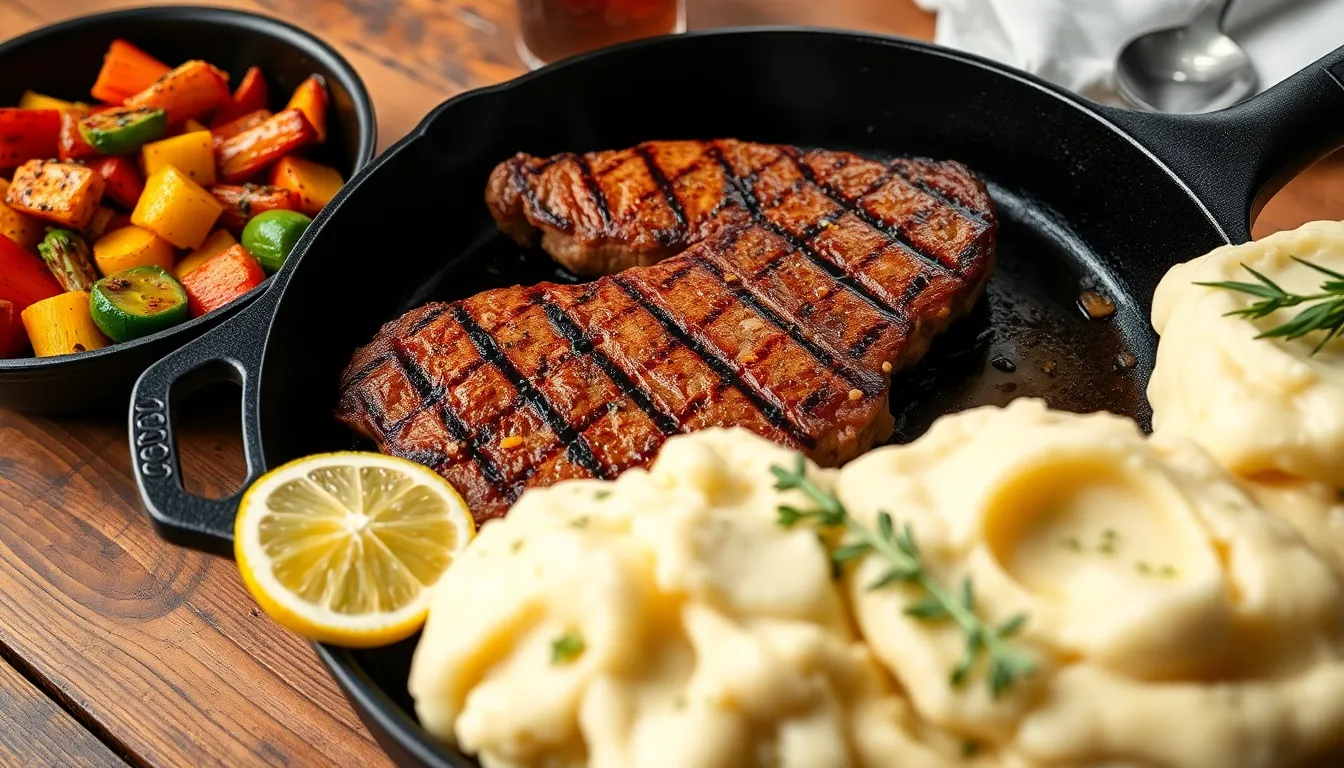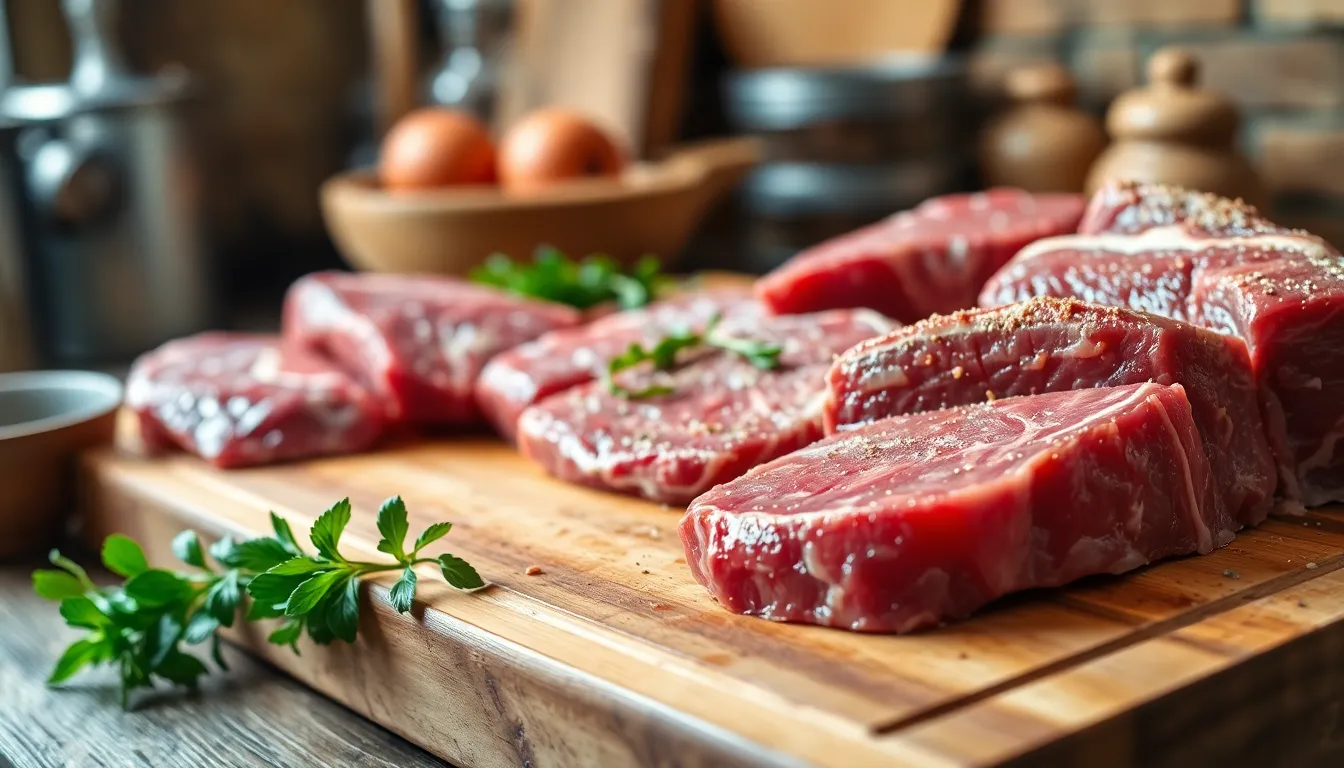Physical Address
304 North Cardinal St.
Dorchester Center, MA 02124

Steak tips are the culinary equivalent of a warm hug on a cold day. Juicy, tender, and packed with flavor, they can turn any ordinary meal into a feast. Whether it’s a casual weeknight dinner or a weekend barbecue with friends, mastering the art of cooking steak tips is a skill every home chef should have in their toolkit.
Cooking steak tips requires proper tools to ensure the best flavors and textures. Certain equipment enhances the cooking process, making it simpler and more enjoyable.
Cast iron skillets deliver excellent heat retention, promoting even cooking. Stainless steel pans offer durability and a non-reactive surface, ideal for searing. Non-stick options simplify cleanup and prevent sticking, making them user-friendly for beginners. Grill pans present a convenient indoor method to achieve grill marks and smoky flavors. For outdoor cooking, gas or charcoal grills provide authentic char and depth, elevating the steak tips’ taste.
Instant-read thermometers provide quick temperature readings, ensuring that steak tips cook to the desired doneness. Marinade injectors introduce flavors directly into the meat, enhancing taste throughout. Basting brushes allow even distribution of marinades or sauces during cooking. Tongs are essential for flipping steak tips without piercing the meat, preserving juices. Meat tenderizers help break down fibers for a more enjoyable texture. Utilizing these gadgets makes preparing steak tips more effective and enjoyable.

Selecting the right cut is crucial for delicious steak tips. The choice affects tenderness, flavor, and cooking time.
Sirloin, tenderloin, and chuck eye represent popular cuts for steak tips. Sirloin offers a balance of flavor and tenderness. Tenderloin provides exceptional tenderness, ideal for quick cooking methods. Chuck eye, a more budget-friendly option, delivers good flavor with more fat, enhancing juiciness.
Consider tenderness when choosing steak cuts. Cuts like tenderloin and ribeye rank high for their softness. Flavor plays a key role too—some cuts, such as flank or skirt, possess rich beefy flavors. Fat content affects juiciness; higher marbling typically leads to a more succulent bite. Cooking method also matters—certain cuts are better suited for grilling, while others shine with slow cooking.
Preparing steak tips involves careful marinating and seasoning to enhance flavor and tenderness.
Marinating steak tips infuses them with flavors while tenderizing the meat. Choose acidic components like vinegar, citrus juice, or yogurt to achieve this. Combine these with herbs, spices, or Worcestershire sauce for added depth. Ideally, let the steak tips marinate for at least 30 minutes; longer marination, up to 24 hours, yields more pronounced flavors. Use a resealable plastic bag or a shallow dish to easily coat the meat. Choosing the right marinade enhances the natural taste of the meat while ensuring juiciness. Remove excess marinade before cooking to prevent flare-ups on the grill.
Seasoning steak tips elevates their flavor profile. Start with basic options like salt and black pepper to enhance natural flavors. Experiment with garlic powder, onion powder, or smoked paprika for additional layers. For a fresh touch, consider incorporating chopped fresh herbs like rosemary, thyme, or parsley. Applying seasoning before cooking ensures an even flavor distribution. Rub the mixture evenly over the steak tips to ensure thorough coverage. Let the seasoned meat sit for 15 to 30 minutes before cooking for optimal flavor absorption.
Several effective cooking methods exist for preparing steak tips. Each technique enhances flavor and tenderness in unique ways.
Grilling steak tips imparts a smoky flavor while offering a pleasing char. Preheat the grill to medium-high heat, ensuring it’s hot enough to sear the meat effectively. Individual steak tips should be spaced adequately on the grill to allow even cooking. Cooking typically takes about 3 to 6 minutes per side, depending on the thickness. It’s crucial to use a meat thermometer to reach an internal temperature of 135°F for medium-rare. After grilling, resting the meat for at least 5 minutes allows juices to redistribute, enhancing flavor and moisture.
Searing steak tips on the stove provides a quick and flavorful method. Start by preheating a cast iron skillet over high heat until it’s sizzling hot. Adding a small amount of oil to the skillet prevents sticking and enhances browning. Place the steak tips in the skillet in a single layer without overcrowding, allowing proper searing. Each side should cook for approximately 3 to 4 minutes. Checking internal temperature ensures the meat reaches 135°F for optimal doneness. After cooking, letting the steak tips rest for 5 to 10 minutes preserves their juiciness.
Slow cooking steak tips delivers tender, flavorful results, especially for tougher cuts. Place the steak tips in a slow cooker with a marinade or broth for added moisture and flavor. Cooking on low heat typically takes 6 to 8 hours, allowing the meat to become exceptionally tender. For best results, choosing ingredients with acidic elements, like tomatoes or vinegar, enhances the tenderizing process. Once finished, the steak tips can be served with pan juices or sauces for additional flavor.
Steak tips offer versatility and flavor, making them a fantastic choice for various meals. Pairing them with suitable sides and presenting them well can elevate the dining experience.
Consider serving steak tips with hearty sides that balance flavors. Roasted vegetables, like asparagus and carrots, add vibrant color and nutritional value. Creamy mashed potatoes or crispy potato wedges provide comfort and satisfaction. In addition, fresh garden salads featuring mixed greens, tomatoes, and cucumbers add a refreshing crunch. Grilled corn on the cob can introduce sweetness, contrasting nicely with the savory steak. Opting for a simple garlic bread can also enhance the overall experience while offering a satisfying bite.
Creating an appealing presentation enhances the steak tips’ allure at the table. Start by choosing a clean, attractive plate for serving. Arrange steak tips neatly; consider stacking them for height or laying them side by side. Garnishing with fresh herbs, such as parsley or rosemary, adds a pop of color and indicates freshness. Use sauces artistically, drizzling them in a creative pattern around the tips. Finally, serving sides in small bowls alongside the steak keeps the plate organized and inviting. Engaging presentations captivate diners and make meals feel special.
Mastering the art of cooking steak tips can truly transform any meal into a memorable experience. With the right techniques and tools, anyone can create tender and flavorful dishes that impress family and friends alike. Choosing the best cuts of meat and employing effective marinating and cooking methods ensures outstanding results every time.
By experimenting with different flavors and presentation styles, steak tips can easily become a favorite at any gathering. Whether grilled, seared, or slow-cooked, these versatile bites promise satisfaction on every plate. Embracing the process of cooking steak tips not only enhances culinary skills but also brings joy to the dining table.